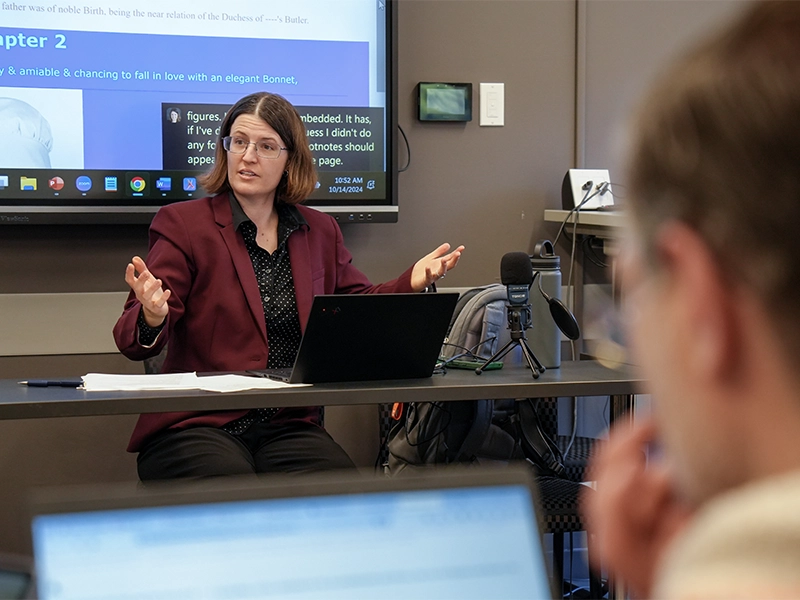Vols Gain Digital Humanities Experience with New Program

Technological tools are vital resources for today’s students to advance knowledge and understanding in workplaces and research arenas. The new Digital Humanities interdisciplinary program within the College of Arts and Sciences offers robust ways for UT Vols to wield these tools as they build career foundations in humanities and social sciences.
Digital Humanities has been a successful graduate certificate program since 2021, and the new minor and interdisciplinary program are a natural extension into undergraduate studies.
“It gives students the opportunity to study from an interdisciplinary perspective and learn digital methodologies,” said program director Hilary Havens, associate professor in English. “Building a digital archive, doing digital and multimodal storytelling, and learning markup languages are transferable skills that will help students when they reach the job market.”
Career Value
A digital-humanities-related internship program is launching with four local partners: UT Libraries, McClung Museum, Ewing Gallery, and Ramsey House. These partnerships demonstrate the opportunities for students that pursue a degree in digital humanities.
“Graduates with a digital humanities minor are well prepared for a growing number of careers in industry, nonprofit, and educational sectors that welcome digital skills alongside the communication and critical thinking abilities that have long been valued in humanities students,” said Havens.
Career paths for digital humanities students and graduates include roles in libraries, museums, galleries, social media management, digital content development, data analysis, web design, digital journalism, project management, and beyond. These students also pursue graduate study in the humanities, communication studies, and information sciences.
Shared Experiences
Havens applies her own field experience in digital humanities to inform her leadership of the program. She has used technology to take new looks at manuscripts of 18th-century literary works.
“I am one of the co-editors of the open-access archive of the Maria Edgeworth Letters Project (MELP),” said Havens. Anglo-Irish author Edgeworth (1768-1849) was arguably the most successful novelist of the Regency period, and MELP will be an open-access archive of her complete correspondence. Havens has also developed methodologies for recovering deleted text from 18th-century novels using image manipulation software. This work has been published in top digital humanities journals and has received grants through UT and external funding agencies, such as the National Endowment for the Humanities.
Most majors in the humanities and social sciences can find ways to enhance their area of study. Recovering lost texts is one of a diverse spectrum of topic areas that students could investigate through digital humanities. Also, the program’s interdisciplinary minor offers opportunities for students to increase their research skills by incorporating digital technology.
“Students learn how to engage critically with digital media and explore current issues such as AI and ethics, digital storytelling and gaming, social media analysis, and beyond by balancing scientific and computational methods with humanities practices such as analysis, critical thinking, and artistic creation,” said Havens. “Digital humanities is very broad, and I encourage students to look at our minor requirements to see the types of classes that count. I would say that all humanities areas are at the forefront of digital interpretation.”
Digital Opportunities Combine
The new course DH 200: Introduction to Digital Humanities is planned for spring 2025. In this class, students will learn a variety of tools and complete a creative final project on gaming and the humanities. Many courses in Digital Humanities will overlap with other new digital futures interdisciplinary programs: Computational Social Sciences and Science, Technology, Health, and Society.
“The overlap is one of the reasons the three minors were created together under a digital-futures umbrella,” said Havens. “Several classes count for all three minors.”
This blend of cutting-edge courses joins the broad array of interdisciplinary programs within the College of Arts and Sciences Consortium on Social and Cultural Inquiry (CoSCI), weaving together a wealth of complementary learning opportunities—and endless possibilities for current and future Vols.
By Randall Brown